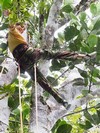AMOBIO
 |
Analyse Multicritère de l’effet potentiel des Obstacles à l’écoulement sur les communautés BIOlogiques |
|
Context and issues
In mainland France, ecosystems are traversed by a dense stream network, the cumulative length of which represents ~800,000 km. These lotic environments support a great biological diversity. The proper functioning of hydrosystems and the life cycle of species (reproduction, growth, food, refuge) are threatened by numerous anthropic pressures, which potentially include flow barriers.
The AMOBIO project aims to understand, through a multi-criteria approach and on a national scale, the effects of barriers in rivers on 1) the hydrology, hydromorphology and continuity of rivers, 2) on the structure and accessibility of corresponding habitats and 3) ultimately on taxonomic and functional variability in response to three biological compartments (diatoms, benthic macroinvertebrates and fish).
The analyzes will be based on a multi-scale spatial and temporal approaches, and aim to reposition barriers within a gradient composed of the other human pressures of the catchment area. Among the hydrobiological compartments, the potential effects of flow barriers on amphihaline migratory fish species as well as exotic and invasive species will be investigated.
The AMOBIO project is based on cooperation between the French Office for Biodiversity (https://ofb.gouv.fr/) and the National Research Institute for Agriculture, Food and the Environment (https:/ /www.inrae.fr/). To carry out this project, a first consortium was formed, bringing together around twenty researchers from INRAE, CNRS and OFB to provide data and reflection.
Methodology
The AMOBIO project will be based on various public and multi-annual databases compiled during standardized sampling across mainland France, such as:
- the flow barrier reference system (ROE),
- the hydrological and hydromorphological characteristics of stream,
- the characteristics of the anthropogenic uses of the catchments,
- the fauna and flora lists between 2004 and 2020
- the lists of functional traits of the different hydrobiological compartments based on scientific expertise.
The multi-criteria analysis will be based on spatial analyzes of the dendritic hydrographic network (graph theory), of the connectivity of watersheds as well as on learning models such as random forests. Particular emphasis will be placed on the notion of spatial scale from the segment of a few rivers to the entire hydrographic network of mainland France.
People involved
 |
DÉZERALD Olivier, Scientist Phone : +33 2 23 48 54 46 Email : olivier.dezerald@inrae.fr |
 |
LASNE Emilien, Scientist Phone : + 33 2 23 48 54 44 Email : emilien.lasne@inrae.fr |
 |
LASSALLE Gilles, Scientist Phone : +33 2 23 48 56 61 Email : gilles.lassalle@inrae.fr |
 |
MIRABEL Ariane, Post-doctorante Phone : +33 2 23 48 58 20 Email : ariane.mirabel@inrae.fr |
 |
ROUSSEL Jean-Marc, Scientist Phone : +33 2 23 48 57 75 Email : jean-marc.roussel@inrae.fr |
Funding and Support
Le projet est financé par l'Office Français de la Biodiversité (https://ofb.gouv.fr/)

